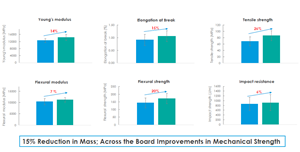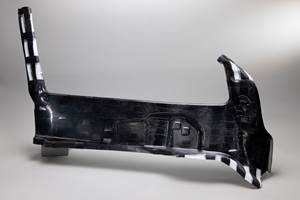Tooling foam, core excels in uniformity, high temps and repeated curing
CAMX 2024: General Plastics Manufacturing Co. returns with advancements to its Last-a-Foam tooling board foam and composite core products.
Share
General Plastics Manufacturing Co. (Tacoma, Wash., U.S.), a provider and manufacturer of rigid and flexible polyurethane foam sheet stock, built-to-print composite assemblies and finished custom parts, is exhibiting the latest advancements to its Last-a-Foam high-temperature tooling board foam and composite core products.
Last-a-Foam tooling board provides aerospace, automotive, marine and other composites manufacturing companies with a high-performance, consistently uniform material that can withstand high temperatures and repeated curing cycles. Affordable and dimensionally stable, this rigid foam board is ideal for prototype machining, high-temperature curing prepregs, vacuum forming, pattern making and other limited-run tooling where traditional metal dies are cost-prohibitive.
Available in 3-50-pound densities, this series is non-abrasive, can be machined with standard high-speed steel cutting tools into complex shapes and is available in custom sizes. It can also be cut cleanly with waterjets and traditional wood-carving tools. General Plastics also offers complete in-house production services that deliver tools machined to final specifications.
According to the company, Last-of-Foam core is renowned for its high strength, low weight and consistent properties. Its formulations are reported to offer a compelling alternative to traditional core materials, such as thermoplastic foam, honeycomb, wood and metal. General Plastics’ closed-cell, water-resistant core materials meet the requirements of numerous industries and complex applications such as FST/OSU-compliant foam core in aircraft interior sandwich panels; high strength-to-weight ratio core material for automotive load floors; dielectric material for radomes; buoyancy foam in subsea applications; and even impact-resistant core in hockey sticks.
General Plastics recently released a new composite core technical paper, which examines the factors to consider when choosing a core material for an application, which is available at www.generalplastics.com.
Related Content
-
Graphene-enhanced SMC boosts molded component properties
CAMX 2023: Commercially sold GrapheneBlack SMC from NanoXplore increases part strength, stiffness and provides other benefits for transportation, renewable energy, energy storage and industrial markets.
-
Perforation technologies available for composite materials
CAMX 2023: Stewarts of America offers precision tooling, machinery, equipment and contract converting services to perforate prepreg films, composite panels, laminates and more.
-
Composites specialist offers fiber handling, converting solutions
CAMX 2023: Visitors will have the opportunity to learn more about Cygnet Texkimp’s creels, filament winding, automation and handling, and recycling, with a special focus on web converting technologies.
Related Content
Graphene-enhanced SMC boosts molded component properties
CAMX 2023: Commercially sold GrapheneBlack SMC from NanoXplore increases part strength, stiffness and provides other benefits for transportation, renewable energy, energy storage and industrial markets.
Read MorePerforation technologies available for composite materials
CAMX 2023: Stewarts of America offers precision tooling, machinery, equipment and contract converting services to perforate prepreg films, composite panels, laminates and more.
Read MoreComposites specialist offers fiber handling, converting solutions
CAMX 2023: Visitors will have the opportunity to learn more about Cygnet Texkimp’s creels, filament winding, automation and handling, and recycling, with a special focus on web converting technologies.
Read MoreHighly tunable, woven lattice reinforcements target automotive structures
CAMX 2023: Startup Weav3D will be demonstrating its two collaborative automotive demonstrator parts and present two conference papers.
Read MoreRead Next
ATL Composites collaboration advances kite-foil board production for Paris Olympics
Breiana Whitehead, pioneering Australian kite-foil sailor, spearheads board design intricacies with ATL Composites to enhance her performance ahead of the July 2024 competition.
Read MoreVIDEO: High-volume processing for fiberglass components
Cannon Ergos, a company specializing in high-ton presses and equipment for composites fabrication and plastics processing, displayed automotive and industrial components at CAMX 2024.
Read MorePlant tour: Daher Shap’in TechCenter and composites production plant, Saint-Aignan-de-Grandlieu, France
Co-located R&D and production advance OOA thermosets, thermoplastics, welding, recycling and digital technologies for faster processing and certification of lighter, more sustainable composites.
Read More













